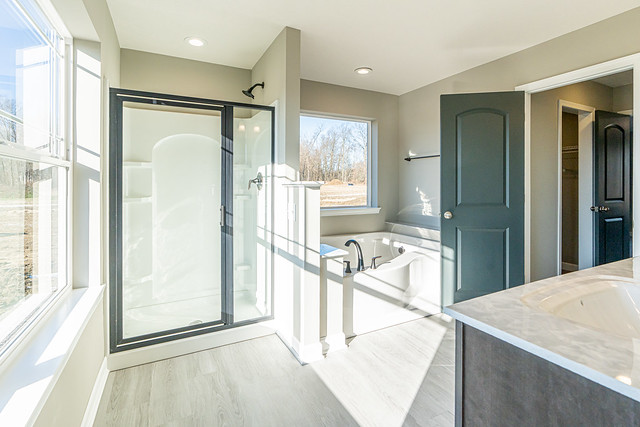Solar Powered IP Camera
Unlike conventional IP cameras that need to be connected to a power source like a PoE switch, solar-powered ones absorb and convert sunlight into electricity. The accumulated energy is stored in a rechargeable battery for continued use.
When choosing a solar security camera, consider its battery capacity and night vision capability. Also, check whether it integrates with smart home systems to let you review the footage from other devices such as additional smart displays.
Features
FOAOOD solar powered security camera with 2K ultra-high definition visuals, night vision and two-way communication. The PIR alarm system and customizable solar ip camera detection zones minimize false alerts, ensuring you only receive notifications about significant movements. The robust and weatherproof construction ensures long-term operation even in harsh outdoor conditions.
The camera supports up to 128GB of storage, meaning it can record weeks or even months of footage. You can also choose to connect the camera to a cloud service for unlimited storage capacity.
Some solar-powered security cameras can be connected to other smart home systems or devices for a more comprehensive monitoring solution. Others can be triggered to send a message to your smartphone via two-way audio, letting you communicate with visitors. Lastly, consider whether the camera supports local storage or cellular data connectivity. The latter may be more convenient if you want to view footage without an internet connection. If you prefer to monitor the camera remotely, look for a mobile app with an intuitive interface and customization options. Some apps also offer live streaming and real-time alerts.
Design
Solar powered security cameras are a popular addition to the surveillance landscape. They eliminate the need for fixed network and power cables to support a camera and offer a cost-effective solution for remote locations.
When selecting a solar powered security camera, look for key features like camera resolution, field of view, solar panel wattage, night vision and motion activation. Some models come with a rechargeable battery for backup, and others allow users to monitor footage remotely using a mobile app.
Look for a solar-powered IP camera that is compatible with your smart home system to integrate it into your existing setup. Many solar-powered security cameras also feature PoE capabilities for wire-free installation. Ensure the model you choose supports modern data encryption standards, which protects video data both at rest (onboard storage) and in transit. This safeguards your company from hackers that can use compromised video feeds to steal sensitive information and disable systems. Also, look for models that have customizable motion sensor settings to adjust the sensitivity of the camera’s motion detector. This ensures the camera only records relevant activity.
Resolution
The resolution of a solar security camera determines how clear and detailed footage the device can capture. A higher resolution will enable you to see faces and license plates clearly, while a lower resolution may deliver grainy images.
A good quality solar ip camera should be able to deliver video in HD resolution. 720P and 1080P cameras are standard resolutions, but more advanced models like those from Reolink offer 4K resolutions that provide incredible clarity. They also harness solar power through integrated panels that convert sunlight into energy to power the device.
While resolution is important, there are other features to consider when choosing a solar ip security camera for your home. These include field of view, night vision, motion activation, and remote monitoring. The latter feature allows you to monitor the camera remotely using your smartphone. You should also look for a security camera that supports Power over Ethernet, which provides power and data connectivity over a single cable. This will save you money on wiring and reduce installation time.
Motion Detection
The motion detection capabilities of a solar security camera are key to its effectiveness as a deterrent. It should be able to differentiate between regular movements and potential threats. This helps minimize false alarms and maximize the efficiency of your surveillance system.
Some solar powered cameras offer advanced cloud storage to allow you to store and view videos from anywhere on a mobile device. This is Bokysee security camera supplier a great option for businesses that have limited access to electricity. However, it’s important to remember that cloud storage is only available for a limited amount of time before the footage will be overwritten.
Other models of solar security cameras have SD card slots that can hold up to 128GB. These are perfect for recording high-quality 2K video footage and providing backup during a power outage. Some brands also include built-in microphones and speakers to allow you to communicate with any people or pets that pass by your camera. A smart PIR sensor reduces false alerts and prioritizes human activity, while a built-in siren wards off any intruders.
Storage
Solar-powered security cameras can work in remote areas where providing a wired power source is impractical or expensive. These versatile tools are ideal for oil & gas well sites, parks & recreation, construction sites, remote gates, ranches, and parking lots.
They can use on-premise or cloud storage to retain recorded footage, making it easier and more affordable to install them in a variety of locations. On-premise storage uses a hard drive located within the device; while cloud storage transmits footage to an online platform and allows for remote monitoring.
Look for solar-powered security cameras with a battery capacity that provides enough power for the camera to function throughout the day. Some also have a solar panel that can generate electricity on overcast days, though it will not be as efficient as when the sun is directly hitting the solar cells. Make sure the camera and solar panel are weather-resistant to prevent damage from rain, snow, or extreme temperatures.


